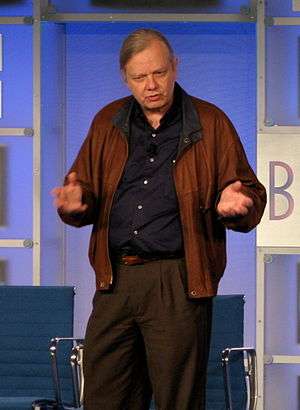R. Stanley Williams
Richard Stanley Williams (born 1951) is research scientist in the field of nanotechnology and a Senior Fellow and the founding director of the Quantum Science Research Laboratory at Hewlett-Packard. He has over 57 patents, with 40 more patents pending.[1] At HP, he led a group that developed a working solid state version of Leon Chua's memristor.[2][3]

Stan Williams speaking at Brainstorm 2008
Williams earned a bachelor's degree in chemical physics in 1974 from Rice University and a Ph.D. in physical chemistry from the University of California, Berkeley in 1978. After graduating, he worked at Bell Labs before joining the faculty at UCLA, where he served as a professor from 1980 to 1995. He then joined HP Labs as director of its Information and Quantum Systems Lab.[4]
Awards and honors
- Foresight Institute Feynman Prize in Nanotechnology (2000)
- Herman Bloch Medal for Industrial Research (2004)
- Julius Springer Prize for Applied Physics (2000)[5]
- Glenn T. Seaborg Medal, UCLA (2007)
gollark: Why not Haskell?
gollark: Why not Chez Scheme?
gollark: Also, I checked, and it looks like JPEG XL is actually inevitable, due to the ability to losslessly recompress existing JPEG images more efficiently.
gollark: Actually, GTech™ GFunctionalProgramming™ just preallocates infinite memory for stack frames so there are no side effects.
gollark: Hmm, actually², my apiologists tell me you are to use JPEG XL.
References
- "R. Stanley Williams, Hewlett-Packard Laboratories "Making and Using Functional Nanostructures 2007 Seaborg Symposium"". UCLA. September 2007.
- Sally Addee (May 2008). "The Mysterious Memristor". IEEE Spectrum.
- R. Colin Johnson (2008-04-30). "'Missing link' memristor created: Rewrite the textbooks?". EE Times.
- "Biography". Hewlett-Packard.
- "Julius Springer Prize for Applied Physics". Springer Science+Business Media.
This article is issued from Wikipedia. The text is licensed under Creative Commons - Attribution - Sharealike. Additional terms may apply for the media files.